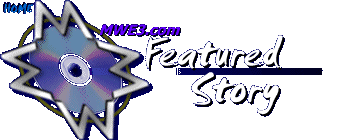CARLOS SANTANA
multi-dimensional warrior
interview written and produced by Robert Silverstein
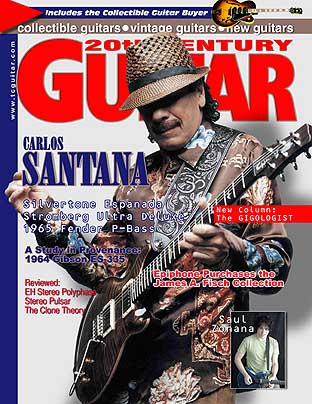 The
music of Carlos Santana introduced America to the Latin rock beat.
The first Santana album from 1969 remains a turning point in American
music history—ushering in the world beat groove of the Woodstock
nation. No matter what music Carlos plays there’s always been
a spiritual side and—combined with the best in Latin music and
rock—there’s always been something about the signature Santana
guitar sound that seems to move the universe. The late 2005 CD release
of All That I Am pairs the legendary Santana guitar sound with
some memorable vocal cameos from Steven Tyler, Michelle Branch and
Los Lonely Boys. All That I Am reconfirms that Carlos Santana
is truly a century spanning phenomenon. Those who long for the instrumental
jazz essence of the Santana sound will also want to check out a 2007
Image Entertainment DVD and CD release called Carlos Santana &
Wayne Shorter “Live At The 1988 Montreux Jazz Festival”.
Recorded and filmed at the Montreux festival on July 14, 1988,
the DVD features Carlos and Wayne Shorter summoning up sounds like
musical telepathy and is essential viewing for fans of two of the
best bands on Columbia during the ‘60s and ‘70s—Santana
and Weather Report. With the vintage Montreux ‘88 on Image
and the new Hymns DVD from Eagle hitting the store shelves
in March 2007, Santana fans can also look forward to the planned Summer
2008 release of an all new instrumental album from Carlos Santana.
Carlos spoke with Robert Steven Silverstein of 20th Century Guitar
magazine and founder of mwe3.com on February 27, 2007.
The
music of Carlos Santana introduced America to the Latin rock beat.
The first Santana album from 1969 remains a turning point in American
music history—ushering in the world beat groove of the Woodstock
nation. No matter what music Carlos plays there’s always been
a spiritual side and—combined with the best in Latin music and
rock—there’s always been something about the signature Santana
guitar sound that seems to move the universe. The late 2005 CD release
of All That I Am pairs the legendary Santana guitar sound with
some memorable vocal cameos from Steven Tyler, Michelle Branch and
Los Lonely Boys. All That I Am reconfirms that Carlos Santana
is truly a century spanning phenomenon. Those who long for the instrumental
jazz essence of the Santana sound will also want to check out a 2007
Image Entertainment DVD and CD release called Carlos Santana &
Wayne Shorter “Live At The 1988 Montreux Jazz Festival”.
Recorded and filmed at the Montreux festival on July 14, 1988,
the DVD features Carlos and Wayne Shorter summoning up sounds like
musical telepathy and is essential viewing for fans of two of the
best bands on Columbia during the ‘60s and ‘70s—Santana
and Weather Report. With the vintage Montreux ‘88 on Image
and the new Hymns DVD from Eagle hitting the store shelves
in March 2007, Santana fans can also look forward to the planned Summer
2008 release of an all new instrumental album from Carlos Santana.
Carlos spoke with Robert Steven Silverstein of 20th Century Guitar
magazine and founder of mwe3.com on February 27, 2007.
{I remember working with Michael Jensen on the timing of this
interview. I first wanted to feature Carlos in 20th Century Guitar
magazine back in the Fall of 2005 but hurricane Wilma and the
subsequent death of my father in the aftermath of Wilma in
Florida made it difficult so instead, but looking back, thanks to
another cover story article I produced, I got call back from Robby
Krieger who gave me solace (by phone) in the ICU during the weeks
before I watched my dad die. Also thanks to Spencer Savage of Image
Entertainment, the erstwhile publicist who was quite helpful to my
work at 20th century guitar magazine helping connect me with some
fantastic artists. Anyway speaking to Carlos back in 2007 was great.
The man is congenial while also being possessed of a manifest wisdom
and divine grace. This interview, first featured in the May 2007 issue
of 20th century guitar is presented from the archives of mwe3.com
and 20th century guitar magazine - editor October 2012}
 Carlos
Santana: Hi, how are you Robert?
Carlos
Santana: Hi, how are you Robert?
Robert Silverstein: Thanks a lot for this interview.
Carlos Santana: My pleasure.
Robert Silverstein: I’ve always loved your music. Back when I
was 15, I was one of the millions that bought the ‘69 Santana
album.
Carlos Santana: Oh, thank you so much man.
Robert Silverstein: Can you let the readers in on what your current
activities are for the first half of 2007? I heard you were compiling
songs for a new album.
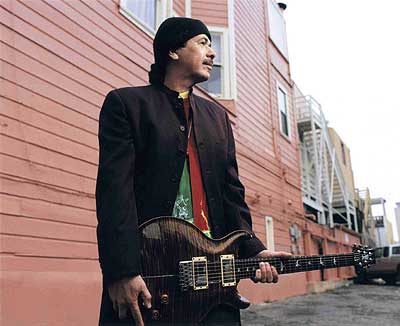 Carlos
Santana: Yes, first of all, I’m not going to tour till 2008,
in the spring. So, in the meantime I’m completing a lot of pies
that are in the oven. One is a double CD, a body of work that I’d
done that I felt people didn’t listen to. Somehow I get the feeling
that a lot of people only listen to Abraxas and Supernatural
and maybe a few others. But this CD is going to be called Multi-Dimensional
Warrior. And the message in each one of the songs is about how
to invite people for people to be conscious and aware of their own
light, that essence that creates miracles. And to me it’s important...like
Bob Marley or John Coltrane or John Lennon...it’s important for
me, beyond the music, to invite people to awaken to that inner power
that we all have. Somehow we think that only Jesus can do it or Allah
can do it or Krishna can do it but we don’t seem to validate
the fact that God created us in his image so therefore we have divinity
and supernatural powers if you will in our DNA as well.
Carlos
Santana: Yes, first of all, I’m not going to tour till 2008,
in the spring. So, in the meantime I’m completing a lot of pies
that are in the oven. One is a double CD, a body of work that I’d
done that I felt people didn’t listen to. Somehow I get the feeling
that a lot of people only listen to Abraxas and Supernatural
and maybe a few others. But this CD is going to be called Multi-Dimensional
Warrior. And the message in each one of the songs is about how
to invite people for people to be conscious and aware of their own
light, that essence that creates miracles. And to me it’s important...like
Bob Marley or John Coltrane or John Lennon...it’s important for
me, beyond the music, to invite people to awaken to that inner power
that we all have. Somehow we think that only Jesus can do it or Allah
can do it or Krishna can do it but we don’t seem to validate
the fact that God created us in his image so therefore we have divinity
and supernatural powers if you will in our DNA as well.
Robert Silverstein: So it’s a double CD?
Carlos Santana: One is just pure instrumental, compilation of instrumental
songs and another one is a compilation of songs that I did from a
CD called Milagro and Spirits Dancing In The Flesh. A
compilation of seven CDs, I just took certain songs. It’s like
creating a letter from a bunch of other CDs that I’d done, to
the listener.
Robert Silverstein: Is the instrumental CD new material?
Carlos Santana: It’s almost eighty percent. That one will come
out later. There’s a lot of music that will be coming out. We
just completed something that’s going to come out, we did it
in ‘88 with Mr. Wayne Shorter. That’s a DVD. And there’s
another DVD that’s going to come out called Hymns. We
recorded a live concert with John McLaughlin, Chick Corea, Herbie
Hancock, Wayne Shorter, Ravi Coltrane, many African musicians and
also my son Salvador and of course my band. So there’s a lot
of music that’s going to come out this year. But the instrumental
one, with just totally new music, it won’t come out till maybe
next summer, not this summer, but next summer.
Robert Silverstein: I know you love pop music and instrumental jazzy
rock stuff. I want to tell you that track off All That I Am called
“Trinity” with Robert Randolph and...
Carlos Santana: Kirk Hammett from Metallica.
Robert Silverstein: You co-wrote that with some interesting people
including Michael Brook and...
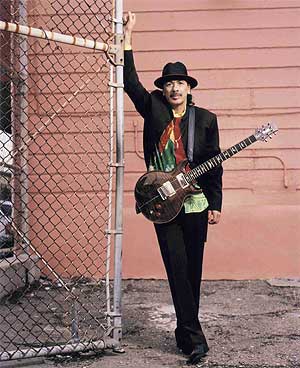 Carlos
Santana: And Nusrat Fateh Ali Khan. You know, what it is, is that
we recorded three tracks in like two hours and we settled for that
one. There’s other things that will come out. The main thing
that I can say about all of this man, is that I’m very grateful
to God and to people, to life, that I can create music—from Metallica
to Placido Domingo. A lot of musicians, for some reason—and its
okay, I’m not putting them down—but a lot of musicians say,
‘I don’t do windows, I only play jazz,’ or ‘I
don’t do this, I only do that.’ I don’t think like
that. I learned from Miles Davis and John Lee Hooker that as long
as its from the heart, you can play “My Favorite Things,”
which is like from a movie, The Sound Of Music or you can do
like “Time After Time” or “Someday My Prince Will Come”
which comes from Sleeping Beauty or Snow White. So I
learned a lot from Miles not to be narrow minded or closed minded
or close your heart. I love everything from African musicians to Metallica
to the blues, all the blues players. So for me, its a different path
to just be able to, kind of like be a waiter, and you serve everyone.
To me its kind of like that with music. I’m very grateful to
be a multidimensional musician.
Carlos
Santana: And Nusrat Fateh Ali Khan. You know, what it is, is that
we recorded three tracks in like two hours and we settled for that
one. There’s other things that will come out. The main thing
that I can say about all of this man, is that I’m very grateful
to God and to people, to life, that I can create music—from Metallica
to Placido Domingo. A lot of musicians, for some reason—and its
okay, I’m not putting them down—but a lot of musicians say,
‘I don’t do windows, I only play jazz,’ or ‘I
don’t do this, I only do that.’ I don’t think like
that. I learned from Miles Davis and John Lee Hooker that as long
as its from the heart, you can play “My Favorite Things,”
which is like from a movie, The Sound Of Music or you can do
like “Time After Time” or “Someday My Prince Will Come”
which comes from Sleeping Beauty or Snow White. So I
learned a lot from Miles not to be narrow minded or closed minded
or close your heart. I love everything from African musicians to Metallica
to the blues, all the blues players. So for me, its a different path
to just be able to, kind of like be a waiter, and you serve everyone.
To me its kind of like that with music. I’m very grateful to
be a multidimensional musician.
Robert Silverstein: Being a Jewish kid from Brooklyn, Santana’s
music was my first exposure to Latin music and World music. I always
felt your music was so liberating.
Carlos Santana: Well thank you man. I did learn a lot from Bill Graham
and Michael Bloomfield about the Yiddish sentiment, which is still
the blues. I love the melodies that I learned from Michael Bloomfield
when he started venturing away from the blues, like East West and
with Paul Butterfield Blues Band. So I understand very clearly that
there’s Hebrew-ness in my DNA. I was born in Mexico but that’s
just where I landed. I actually have components of every person in
my DNA. Like you, I am a fragment that comes from the stars, literally
from the universe. I just don’t come from my mom and dad. You
know what I mean? We are all multidimensional creatures and once you
start perceiving yourself like that, then you’re able to express
more totality, then just saying, ‘I’m only Hebrew. I only
play Hebrew music or I’m only Mexican, I only play Mariachi music
or I’m only Puerto Rican, I only play Salsa.’ You are what
you is, you are what you perceive. If that’s what you wanna be,
go ahead. There’s no judgment, there’s no negative or positive,
that’s just the way it is. I don’t see myself like that.
I don’t have a ceiling, nor do I want to have a ceiling over
my existence. I love Coltrane, I love Bob Marley, I love Marvin Gaye.
I like Stevie Ray or Jimi Hendrix. So its easier for me to coexist
in this planet more in a harmonious way.
Robert Silverstein: Your music always empowered me to open my mind
and I think that’s still true with your new stuff. It’s
great that you can work with the younger players and also go back
to the more symphonic fusion stuff and then do a track with Michelle
Branch or Steven Tyler. It’s a miraculous thing in music these
days.
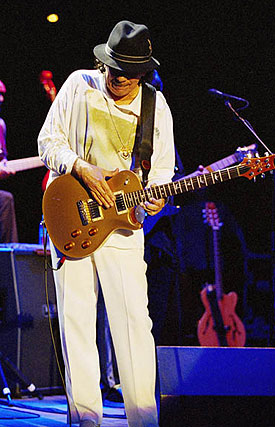 Carlos
Santana: Well, you are a miracle. Steven Tyler and Michelle Branch...everybody
has their own supreme beauty. It’s kind of like learning to see
something beyond what you see in the mirror. You mom sees you a certain
way and your teachers see a certain way and your friends see you a
certain way and your lover sees you a certain way. But those are just
fragments. But who are you really when you look in the mirror? Who
are you to yourself? And for me, the music—that’s what I
learned from The Beatles and Marvin Gaye and Bob Dylan—is that
music is more than just a song and dance man. I know that Bob Dylan
used to talk about, ‘I’m just a song and dance man.’
But he’s kidding. His music, whether he likes it or not, it has
a profound message to all people. I think it would be very ignorant
for Palestine not to like Bob Dylan only because he’s Hebrew.
You’ve go to look at the big picture. I think, when the Berlin
wall came down, I think a day will come when Cuba will be different
and Jerusalem will be different. I do see the end of brutality in
this planet. I see three things: compassion, mercy and forgiveness.
Those are the three things that I think that all people, everyone
should learn like you learn the language of English or accounting
or astrology or law. They’re all languages but the language that
we should invest more in I believe is compassion, mercy and forgiveness
because I think that those are the ones who will take us as humans
into a place where we can create heaven here. We don’t have to
die to go get it. That’s it.
Carlos
Santana: Well, you are a miracle. Steven Tyler and Michelle Branch...everybody
has their own supreme beauty. It’s kind of like learning to see
something beyond what you see in the mirror. You mom sees you a certain
way and your teachers see a certain way and your friends see you a
certain way and your lover sees you a certain way. But those are just
fragments. But who are you really when you look in the mirror? Who
are you to yourself? And for me, the music—that’s what I
learned from The Beatles and Marvin Gaye and Bob Dylan—is that
music is more than just a song and dance man. I know that Bob Dylan
used to talk about, ‘I’m just a song and dance man.’
But he’s kidding. His music, whether he likes it or not, it has
a profound message to all people. I think it would be very ignorant
for Palestine not to like Bob Dylan only because he’s Hebrew.
You’ve go to look at the big picture. I think, when the Berlin
wall came down, I think a day will come when Cuba will be different
and Jerusalem will be different. I do see the end of brutality in
this planet. I see three things: compassion, mercy and forgiveness.
Those are the three things that I think that all people, everyone
should learn like you learn the language of English or accounting
or astrology or law. They’re all languages but the language that
we should invest more in I believe is compassion, mercy and forgiveness
because I think that those are the ones who will take us as humans
into a place where we can create heaven here. We don’t have to
die to go get it. That’s it.
Robert Silverstein: What a great combination between you and Paul
Reed Smith... I know you’ve spoken about this before but what
got you interested in PRS guitars and are there any new developments
with PRS?
Carlos Santana: Yes, what got me in to Paul Reed was Paul, this very
shiny bright stuff in his eyes. He’s got a lot of enthusiasm
and a lot go get ‘em guy brilliance in him and he will not be
deterred. His guitars, when the arrive in my house—we have a
contract so he sends me three or four guitars a year to try out then
I keep the ones that I keep—they always arrive in tune. But I’ve
been playing also with Strats, the Stratocaster, because of my love
for a certain thing. And so we’re working together to have the
Paul Reed look but maybe a little bit more of a Strat sound. And that’s
something that we’re still pursuing. I play exclusively Boogie
amplifiers since the beginning. Paul Reed Smith...and I also play
Alexander Dumble since about six, seven years now. A combination of
Paul Reed, Alexander Dumble amplifiers and definitely the Boogie.
I cannot deal without the Boogie. For some reason, that’s the
voice that I gravitate to right now. It’s easier for to just
close my eyes and don’t have to think about messing with knobs
and messing with this, messing with that. Just close your eyes and
let it flow.
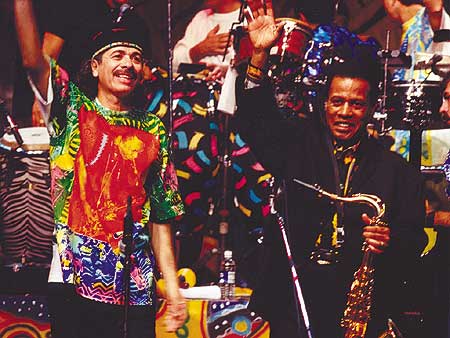 Robert
Silverstein: Can you say something about your classical guitar. The
Alvarez A-Yairi.
Robert
Silverstein: Can you say something about your classical guitar. The
Alvarez A-Yairi.
Carlos Santana: Right, there’s a beauty in nylon strings which
is it gives you that romantic...Manitas de Plata and Paco de Lucia
and that Bola Sete kind of setting. So I’m very grateful man...you
don’t have to be Segovia to get a sound. Everything’s an
extension, electric guitar or acoustic nylon strings. They’re
just like brushes and pencils. It’s like what are you trying
to say that’s important through it. What’s your story morning
glory? (laughter)
Robert Silverstein: I heard the original Santana reformed in San Francisco
last month for a show. That must have been an amazing experience.
Carlos Santana: Yes, it was. It’s always very gratifying and
exhilarating to play with Gregg Rolie and the original musicians.
It was a lot of fun. I think we did two or three songs. The chemistry
is still there. When you get The Beatles together or you get Cream
together or The Police together, there’s something about the
chemistry of certain musicians, it’s intact. It’s always
there.
Robert Silverstein: 37 years after Abraxas, can you remember
the inspiration behind combining “Black Magic Woman” with
“Gypsy Queen”, a powerhouse song still amazes.
Carlos Santana: It’s an extension of people that I love. I love
Peter Green and Gabor Szabo. I love Tito Puente...excuse me...I’ve
been really blessed that I get to learn from people that I love—from
John Lee Hooker to Miles—yet when I play Otis Rush or John McLaughlin
it doesn’t sound like them. It still sounds like me, even though
we know that the song “Gypsy Queen” 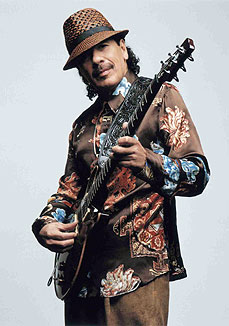 comes
from Gabor Szabo and “Black Magic Woman” is from Peter Green.
They collect the royalties, as they say. However people identify immediately
with my sound, or our sound. The Santana band sound. And to me it’s
something that I would just say to all people who are reading this
magazine, take the time to go inside a room, turn off everything,
go inside and get your own fingerprints. Get your own uniqueness and
individuality together. It’s good to check out Stevie Ray and
Jimi Hendrix and Jeff Beck but don’t forget the best part, you!
(laughter) ‘Cause they’re all cheering for you. Go get you.
Work on you. Like a snake sheds skin, get rid of Stevie, as much as
you love him. Get rid of George Benson or Pat Martino as much as you
love ‘em. Go get you. ‘Cause Pat Martino, George Benson
and Stevie, they’re cheering for you to go get yourself. Go get
your own vision, your own sound, that’s it man.
comes
from Gabor Szabo and “Black Magic Woman” is from Peter Green.
They collect the royalties, as they say. However people identify immediately
with my sound, or our sound. The Santana band sound. And to me it’s
something that I would just say to all people who are reading this
magazine, take the time to go inside a room, turn off everything,
go inside and get your own fingerprints. Get your own uniqueness and
individuality together. It’s good to check out Stevie Ray and
Jimi Hendrix and Jeff Beck but don’t forget the best part, you!
(laughter) ‘Cause they’re all cheering for you. Go get you.
Work on you. Like a snake sheds skin, get rid of Stevie, as much as
you love him. Get rid of George Benson or Pat Martino as much as you
love ‘em. Go get you. ‘Cause Pat Martino, George Benson
and Stevie, they’re cheering for you to go get yourself. Go get
your own vision, your own sound, that’s it man.
Robert Silverstein: I always loved Fleetwood Mac’s version of
“Black Magic Woman” too but when you did it, the song took
off to the stratosphere.
Carlos Santana: They’re complete on their own. Fleetwood Mac
are complete in their own thing. There will always be room for Peter
Green, which is like an accumulation of the best of the best of B.B.
King and Elmore James. But still, B.B. King is B.B. King and Peter
Green is Peter Green and I’m me. And that’s the beauty of
it. And you are you!
Robert Silverstein: The 2007 DVD and double CD on Image featuring
you with Wayne Shorter, Montreux ‘88 is great. Compared
to the pop sound of All That I Am, the music you made with
Wayne is incredible. I call it Santana meets Weather Report.
Carlos Santana: (laughter) Yeah, well it’s kind of like that.
We toured together in ‘72. Thank you for saying that. That’s
one of my favorite bands. That and Miles and Coltrane. I feel very
grateful to God. That was one of the highlights of my life, to do
a tour with Mr. Wayne Shorter. He’s the genius of geniuses and
the most sweetest person you ever want to be around. And so, I learned
a lot from him and I continue to learn a lot from him. He’s truly
an angel and a saint on earth. Like Desmond Tutu and the Dalai Lama.
Wayne Shorter is a whole other kind of light from another galaxy.
And he’s the kind of person—like if Jimi was here, Hendrix,
and Marvin Gaye and Coltrane—when anybody listens to Wayne your
eyes change. It’s like beholding something divine in front of
you. And I’m sure he sees the same thing in you and in me. Because
we all have it. But boy, he’s something else. Another CD is going
to come out as I said very soon, called Hymns, with Wayne Shorter,
Chick Corea, John McLaughlin, Herbie Hancock, Ravi Coltrane and my
son and many African musicians. There’s music that will come
out later on with, of course Buddy Guy. I feel really, really grateful.
Eagle Eye Cherry. I want to continue just to—like a maitre D'—just
to serve people and if anybody invites me from Metallica to Placido
Domingo...that what I want to do. I just want to be able to play music
and compliment life.
Robert Silverstein: Can you say something about the 2004 Blues
At Montreux DVD?
 Carlos
Santana: I just feel like its all part of the same continuation of
the joy of coexisting and sharing. At this point I feel very, very
secure and confident that I am welcome onstage with Buddy Guy, B.B.
King or Otis Rush...the blues musicians and also the African musicians,
Brazilian musicians, the jazz musicians. That to me is one of the
greatest things that any musician, any person can have. When the door
is open to every room in the house! Including the basement! (laughter)
So it’s all in the continuation, man. I get a tremendous joy
and a tremendous satisfaction—I’m the opposite of I don’t
get no satisfaction. I get a lot of satisfaction from being in the
presence of everyone from, the gentleman from Living Colour, everyone.
Vernon Reid, Derek Trucks, Ben Harper, Anastasio. We’re all one.
And it feels really, really good man. There’s no competition.
This is not soccer where someone has to lose or someone has to win.
We are musicians and hopefully someday you and I can also play together.
Carlos
Santana: I just feel like its all part of the same continuation of
the joy of coexisting and sharing. At this point I feel very, very
secure and confident that I am welcome onstage with Buddy Guy, B.B.
King or Otis Rush...the blues musicians and also the African musicians,
Brazilian musicians, the jazz musicians. That to me is one of the
greatest things that any musician, any person can have. When the door
is open to every room in the house! Including the basement! (laughter)
So it’s all in the continuation, man. I get a tremendous joy
and a tremendous satisfaction—I’m the opposite of I don’t
get no satisfaction. I get a lot of satisfaction from being in the
presence of everyone from, the gentleman from Living Colour, everyone.
Vernon Reid, Derek Trucks, Ben Harper, Anastasio. We’re all one.
And it feels really, really good man. There’s no competition.
This is not soccer where someone has to lose or someone has to win.
We are musicians and hopefully someday you and I can also play together.
Robert Silverstein: Would you ever consider doing a Santana video
influences Vol. 2? ‘Cause I really enjoyed the video you did
honoring Wes, Bola Sete and Gabor. Who would be on your wish list
for a Vol. 2?
Carlos Santana: Sure. Ali Akbar Khan, Manitas de Plata, a supremely
Flamenco musician, some African musicians, Tinariwen. Just like that!
Okay man, you take care.
Robert Silverstein: Thank you very much.
Carlos Santana: My pleasure.
Thanks to Carlos Santana @ www.santana.com
- Image Entertainment @ www.image-entertainment.com
and Legacy Recordings @ www.LegacyRecordings.com
